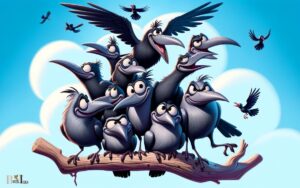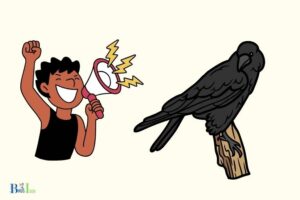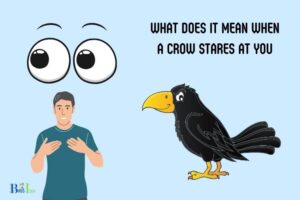What Does Rain Crow Mean? Discover!
The term ‘rain crow’ commonly refers to the Yellow-billed Cuckoo (Coccyzus americanus), a bird known for its distinctive call that is often heard during humid or rainy weather, leading to the belief that its cry foretells rain.
Rain crows are birds that have been associated with predicting rain due to their vocal behavior before storms.
They are found in various parts of North America and are known for their long tails and sleek body.
The rain crow’s call serves as a natural barometer, alerting those who listen to the potential for impending showers and thunderstorms.
The Rain Crow holds an intriguing place in folk traditions due to its connection with predicting rainfall.
Its unique behavioral pattern of becoming more vocal preceding precipitation has sparked interest and observations over time.

Key Takeaway
The Origin of Rain Crow
The origin of the term ‘rain crow’ is rooted in Native American folklore and has been passed down through generations as a symbol of impending rain.
In many Native American cultures, the call of the rain crow is believed to be a sign of an approaching storm or the onset of rainy weather.
This symbolic connection between the bird and precipitation has been ingrained in the cultural beliefs of various tribes for centuries, with the rain crow being revered as a natural indicator of forthcoming rain.
The significance of the rain crow in Native American folklore highlights the deep reverence and understanding of the natural world that has been integral to indigenous cultures, reflecting a profound respect for the interconnectedness of all living beings and the environment.
Myths and Folklore Surrounding Rain Crow
Myths and folklore surrounding the rain crow in Native American culture intricately weave together the natural world and spiritual beliefs, emphasizing the bird’s revered role as a harbinger of impending rain.
Within these myths and folklore, the rain crow is often depicted as a messenger from the spirit world, symbolizing renewal, rebirth, and cleansing.
The stories also portray the rain crow as a wise and mystical creature, possessing the ability to communicate with both the physical and spiritual realms.
Additionally, the rain crow is believed to bring not only rain but also blessings and good fortune, making it a symbol of hope and positivity in Native American folklore.
These narratives showcase the deep connection between indigenous peoples and the natural world, as well as their respect for the signs and wonders it presents.
Rain Crow Symbolism in Different Cultures
The symbolism of the rain crow varies across different cultures, offering unique insights into its significance.
In folklore, the rain crow often represents themes of renewal, transformation, and the natural cycles of life.
Understanding the cultural interpretations of the rain crow provides a rich tapestry of meanings that transcends geographical boundaries and highlights the universal human connection to nature.
Rain Crow in Folklore
Exploring the symbolism of Rain Crow in different cultures reveals its significance as a powerful and revered figure in folklore.
- In Native American folklore: The Rain Crow is seen as a symbol of renewal and rebirth, as its call is believed to bring the rain, essential for the vitality of crops and the land.
- In African folklore: The Rain Crow is often associated with wisdom and foresight, as its unique behavior during changing weather patterns is interpreted as a sign of spiritual communication.
In various cultures, the Rain Crow is a symbol of hope, change, and the interconnectedness of nature and spirituality.
Its presence in folklore highlights the universal human desire for harmony with the natural world and the belief in the profound wisdom of the natural elements.
Cultural Interpretations of Rain Crow
Incorporating the symbolic significance of the Rain Crow in different cultures, the gerund noun ‘Cultural Interpretations of Rain Crow (Rain Crow Symbolism in Different Cultures)’ reflects its universal portrayal as a powerful and revered figure in folklore.
| Culture | Rain Crow Symbolism |
|---|---|
| Native American | Rain Crow is seen as a messenger of rain and a symbol of renewal and rebirth. |
| African | In African cultures, the Rain Crow is often associated with wisdom and foresight. It is believed to bring messages from the spirit world. |
| Asian | In some Asian cultures, the Rain Crow is revered as a symbol of good fortune and prosperity. It is also associated with the arrival of the monsoon season, bringing relief from drought. |
This diverse symbolism of the Rain Crow across cultures highlights its profound impact and significance, resonating with the universal human desire for freedom and renewal.
Rain Crow’s Connection to Weather Prediction
Connected to weather prediction, the behavior of rain crows is known to signal impending rain.
These birds exhibit specific actions that have been observed to precede rainfall, making them a natural forecasting tool.
Here are some interesting connections between rain crows and weather prediction:
Distinct Calls
Rain crows are known for their distinctive calls, which change in response to approaching rain. This behavior serves as an audible indication of impending precipitation.
Locals often rely on the consistency of these calls to gauge the timing and intensity of the oncoming rain, incorporating them into their daily routines and agricultural practices.
Foraging Patterns
Rain crows alter their foraging patterns in anticipation of rain, displaying heightened activity levels and specific feeding behaviors.
These changes in behavior provide valuable cues for weather prediction, offering insights into the timing of approaching rain systems.
Rain Crow’s Distinctive Call and Behavior
Exhibiting distinctive calls and altered foraging patterns, rain crows display behavior that serves as a reliable indicator of impending rainfall.
Their unique call, often described as a ‘rain crow call,’ becomes more frequent and intense as a storm approaches.
This behavior is believed to be linked to their heightened activity in response to changing atmospheric pressure and humidity.
In addition to their vocalizations, rain crows also exhibit altered foraging behavior, becoming more active and visible prior to rainfall.
They are known to forage closer to the ground and in open areas, possibly in search of insects that emerge before a rain event.
Understanding these behavioral changes can provide valuable insights into local weather patterns, making rain crows an essential part of traditional weather prediction in many cultures.
Transitioning into the subsequent section about the conservation and protection of rain crows, it is important to consider how human activities and habitat loss impact these unique birds.
Conservation and Protection of Rain Crows
The preservation of rain crows and their natural habitats is crucial for maintaining ecological balance and safeguarding their unique behavioral indicators of impending rainfall.
Conservation efforts are essential to ensure the survival of rain crows and to protect their role in the ecosystem.
To achieve this, it is important to:
- Preserve Natural Habitats
- Protect and restore the diverse habitats where rain crows reside, including woodlands, forests, and open fields.
- Implement sustainable land management practices to maintain suitable environments for rain crows and other wildlife.
What Does a Rain Crow Sound Like??
Rain Crow is known for its distinctive call, which some people believe is associated with the arrival of rain.
The call is a series of two-part, hollow, and wooden-sounding notes. The cuckoo’s call is often described as “kowp, kowp, kowp” or “kup, kup, kup,” and it has a unique quality that can make it stand out in the environment.
It’s important to note that the belief that the call of the Yellow-billed Cuckoo is associated with rain is more of a cultural or folkloric interpretation rather than a scientifically proven connection.
The association might stem from the fact that these birds are more vocal during the breeding season, which typically coincides with warmer and more humid weather.
If you’re interested in hearing the sound of a Yellow-billed Cuckoo, you can find audio recordings online or in bird identification guides.
Birdwatchers and ornithologists often use these recordings to help identify bird species based on their calls.
Conclusion
The rain crow holds significant cultural and symbolic meaning across different cultures and traditions.
Its distinctive call and behavior have long been associated with weather prediction and natural phenomena.
This enigmatic bird, with its mysterious and haunting call, continues to captivate the imagination and inspire awe.
Its presence in myths and folklore adds depth and complexity to the understanding of its role in various cultural traditions.






